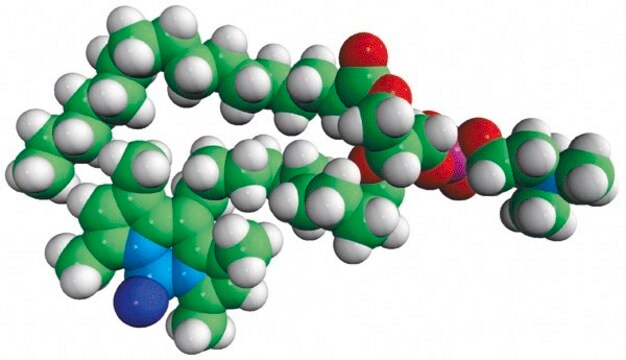810335C
Avanti
18:1 Cy5 PE
Avanti Research™ - A Croda Brand
Synonym(s):
1,2-dioleoyl-sn-glycero-3-phosphoethanolamine-N-(Cyanine 5)
About This Item
Recommended Products
Assay
>99% (TLC)
form
liquid
packaging
pkg of 1 × 1 mL (810335C-1mg)
pkg of 5 × 1 mL (810335C-5mg)
manufacturer/tradename
Avanti Research™ - A Croda Brand
concentration
1 mg/mL (810335C-1mg)
1 mg/mL (810335C-5mg)
shipped in
dry ice
storage temp.
−20°C
Application
- as a standard for the estimation of absolute density of Cy5 labeled Trx-His6-NCav-CT on supported lipid bilayers (SLB)
- in annexin-coated vesicle production
- to label vesicle types in order to optically distinguish them from other vesicles and to initiate biochemical reactions in a cell-mimetic compartment
Biochem/physiol Actions
Packaging
Legal Information
Signal Word
Danger
Hazard Statements
Precautionary Statements
Hazard Classifications
Acute Tox. 3 Inhalation - Acute Tox. 4 Oral - Aquatic Chronic 3 - Carc. 2 - Eye Irrit. 2 - Repr. 2 - Skin Irrit. 2 - STOT RE 1 - STOT SE 3
Target Organs
Central nervous system, Liver,Kidney
Storage Class Code
6.1D - Non-combustible acute toxic Cat.3 / toxic hazardous materials or hazardous materials causing chronic effects
WGK
WGK 3
Flash Point(F)
does not flash
Flash Point(C)
does not flash
Certificates of Analysis (COA)
Search for Certificates of Analysis (COA) by entering the products Lot/Batch Number. Lot and Batch Numbers can be found on a product’s label following the words ‘Lot’ or ‘Batch’.
Already Own This Product?
Find documentation for the products that you have recently purchased in the Document Library.
Our team of scientists has experience in all areas of research including Life Science, Material Science, Chemical Synthesis, Chromatography, Analytical and many others.
Contact Technical Service









